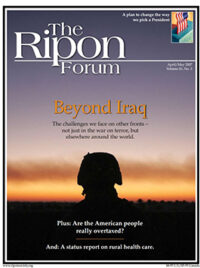
The United States faces numerous challenges in the Western Hemisphere. All demand a collaborative response, both within the United States – that is, between the Congress and the executive branch – and between the United States and the countries of Latin America.
From immigration reform to the pursuit of economic development to stemming narco-trafficking or exploring alternative energy, U.S. interests will be difficult to secure unless U.S. credibility in the region can be restored. That requires a meaningful embrace of the social agenda that is the top priority of most of the governments in the region.
Indeed, unless the United States can made good on a renewed commitment to address the massive poverty and social injustice that exist, in varying degrees of severity, throughout Latin America, President Bush’s two terms in office will go down in history as the worst for hemispheric relations in well over a generation.
Consider the following: some 40 percent of all Latin Americans are considered poor, defined as living on $2 a day or less.
Much has been made of Latin America’s so-called “shift to the left” since late 2005, the beginning of a cycle of over a dozen presidential elections. But less understood are the two general trends behind such electoral outcomes. The first is widespread popular dissatisfaction with persistent poverty and widening gaps between rich and poor in the wake of two decades of neo-liberal reform. Second, as reflected in the polls of Latinobarómetro and others, is discontent with the incapacity of traditional political elites to respond to growing demands for greater equity, participation, and economic, political, and social inclusion.
Thus, the “rise of the left” owes much to core problems arising from the quality of democracy as experienced by the average citizen: the lack of good jobs and, in their absence, the growth of the informal sector; a sharp rise in violent crime; disenchantment with the institutions of democratic governance, especially political parties; and dislocations – in Latin America as well as in the United States – related to the domestic effects and foreign policy implications of globalization.
Consider the following: some 40 percent of all Latin Americans are considered poor, defined as living on $2 a day or less. In one of the hemisphere’s poorest countries, Bolivia, the World Bank reports that one and a half million people (out of a population of a little less than 9 million) subsist on 16 cents a day or less. Should it be so difficult under these circumstances to understand the popular enthusiasm for President Evo Morales, a grass-roots indigenous leader, or for policies aimed at ensuring a greater Bolivian share of the profits from its natural gas industry? Similarly, while Venezuelan President Hugo Chávez may be widely viewed in the region as an authoritarian despot, he has delivered billions of dollars in oil subsidies, debt relief, and infrastructure financing, all at a time of steadily decreasing U.S. economic assistance to the region.
Rhetorically at least, the State Department for some time has recognized the relevance of poverty and inequality for the consolidation of the region’s democracies. President George Bush’s speeches during his recent trip to five Latin American countries (and in Washington just as he left) also reflect that awareness, a welcome change from an agenda that for most of the last six years has centered on the virtues of free trade and the linkages between counter-narcotics and counter-terrorism.
Rhetorically at least, the State Department for some time has recognized the relevance of poverty and inequality for the consolidation of the region’s democracies… But U.S. instruments for addressing the region’s poverty and social agenda have been scant.
But U.S. instruments for addressing the region’s poverty and social agenda have been scant. Some of the specific initiatives announced before the President Bush’s trip – sending a Navy ship to provide medical care, for example – recall the civic action programs of the 1960s, in which military teams took over development roles, to the detriment of civilian authority. Other programs – broadening opportunities for Latin American youth to study English, or expanding OPIC loan guarantees – are likely to be met with widespread skepticism in the hemisphere.
Worse still, this year’s foreign aid budget – drafted and debated within the administration and presented to Congress before President Bush left for the region –actually cuts economic aid to Latin America and the Caribbean, a trend that has accelerated since 2004. Excluding Colombia, which has received the lion’s share of U.S. aid to the region, proposed development assistance to the Western hemisphere has been reduced by about 25 percent.
The jury will be out for some time as to whether the visits of President Bush and other senior U.S. officials to the region can succeed in overcoming the damage to U.S. prestige caused by the war in Iraq and scandals such as Abu Ghraib. Joint initiatives with Brazilian President Luiz Ignacio Lula da Silva on alternative fuels such as ethanol can go a long way in demonstrating a capacity for mature partnership on a critical issue of shared interest. But getting in sync with the region – its presidents and its public – will require a more profound shift.
It would mean, first, accepting that addressing poverty is a legitimate function and responsibility of the state and not simply an expected outcome of market forces. It would also imply embracing the secondary policies that are necessary to enhance the capacity of free trade to contribute to development.
Failure to do so is hurting the cause of free trade not only Latin America, but also in the United States.
Cynthia J. Arnson is the Director of the Latin American Program at the Woodrow Wilson International Center for Scholars.




